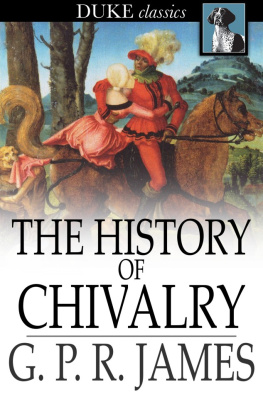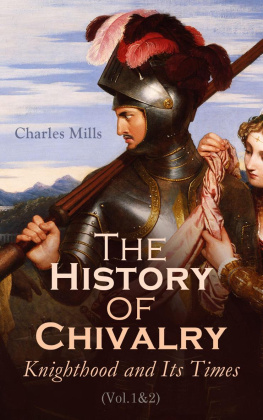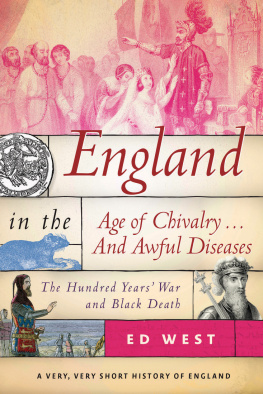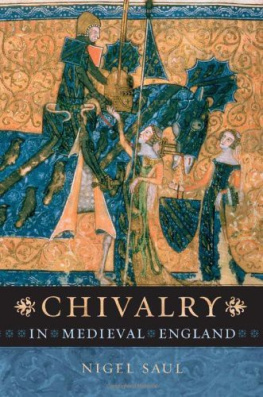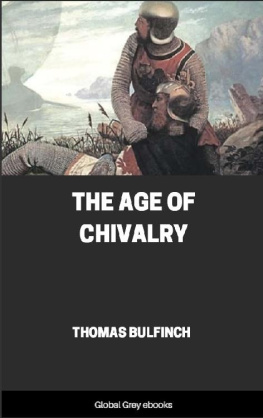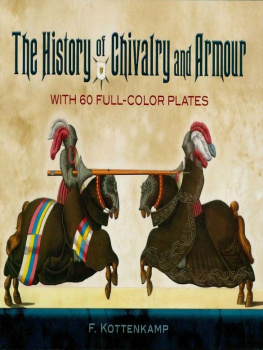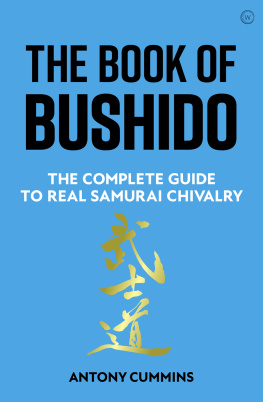THE HISTORY OF CHIVALRY
* * *
G. P. R. JAMES
*
The History of Chivalry
First published in 1830
ISBN 978-1-63421-200-7
Duke Classics
2014 Duke Classics and its licensors. All rights reserved.
While every effort has been used to ensure the accuracy and reliability of the information contained in this edition, Duke Classics does not assume liability or responsibility for any errors or omissions in this book. Duke Classics does not accept responsibility for loss suffered as a result of reliance upon the accuracy or currency of information contained in this book.
Contents
*
Preface
*
In writing the pages which follow this Preface, I have had to encounterthe difficulty of compressing very extensive matter into an extremelylimited space. As the subject was, in my eyes, a very interesting one, andevery particular connected with it had often been food for thought andobject of entertainment to myself, the task of curtailing was the moreungrateful: nor should I have undertaken it, had I not been convinced bymy publisher that one volume would be as much as the public in generalwould be inclined to read. I wished to write upon Chivalry and theCrusades, because I fancied that in the hypotheses of many other authors Ihad discovered various errors and misstatements, which gave a falseimpression of both the institution and the enterprise; and I haveendeavoured, in putting forth my own view of the subject, to advance noone point, however minute, which cannot be justified by indisputableauthority. A favourite theory is too often, in historical writing like thebed of the ancient Greek; and facts are either stretched or lopped away toagree with it: but to ensure as much accuracy as possible, I have takenpains to mark in the margin of the pages the different writers on whoseassertions my own statements are founded, with a corresponding figure, bywhich each particular may be referred to its authority.
In regard to these authors themselves, it seems necessary here to givesome information, that those persons who are inclined to inquire beyondthe mere surface may know what credit is to be attached to each.
On the first crusade we have a whole host of contemporary writers, many ofwhom were present at the events they describe. Besides these are severalothers, who, though they wrote at an after-period, took infinite pains torender their account as correct as possible. The authors I haveprincipally cited for all the earlier facts of the Holy War are, Williamof Tyre, Albert of Aix, Fulcher of Chartres, Raimond of Agiles, Guibert ofNogent, Radulph of Can, and Robert, surnamed the Monk.
William of Tyre is, beyond all doubt, the most illustrious of the manyhistorians who have written on the crusades. Born in Palestine, and thoughboth educated for the church and raised step by step to its highestdignities, yet mingling continually in the political changes of the HolyLandthe preceptor of one of its kingsfrequently employed in embassiesto Europe, and ultimately Archbishop of Tyre and Chancellor of the kingdomof Jerusalem, William possessed the most extensive means of gatheringmaterials for the great work he has left to posterity. He brought to histask, also, a powerful mind, as well as considerable discrimination; andwas infinitely superior in education and every intellectual quality to thegeneral chroniclers of his age. He was not born, however, at the time ofthe first crusade; and consequently, where he speaks of the events ofthat enterprise, we may look upon him as an historian, clear, talented,elegant, and not extremely credulous; but we must not expect to find thevivid identity of contemporaneous writing. In regard to the history of hisown days he is invaluable, and in respect to that of the times whichpreceded them, his work is certainly superior, as a whole, to any thingthat has since been written on the subject.
A much more vivid and enthusiastic picture of the first crusade is to befound in Albert of Aix, from whom William of Tyre borrowed many of hisdetails; but the Syrian Archbishop, living long after, saw the events herecounted as a whole, rejected much as false that Albert embraced as true,and softened the zealous fire which the passions and feelings of themoment had lighted up in the bosom of the other. Albert himself was notone of the crusaders; but living at the time, and conversing continuallywith those who returned from the Holy Land, he caught, to an extraordinaryextent, the spirit of the enterprise, and has left behind him a brillianttranscript of all the passed-by dreams and long-extinguished enthusiasmsof his day.
Thus, as a painting of manners and customs, the ChroniconHierosolymitanum is one of the most valuable records we possess, and theaccount there given of Peter the Hermit and Gautier sans avoir is inmany points more full and comprehensive than any other.
Fulcher of Chartres set out for the Holy Land with Stephen, Count ofBlois, one of the first crusaders. He soon after became chaplain toBaldwin, the brother of Godfrey de Bouillon, and ended his days a canon ofthe Holy Sepulchre. His relation is useful in many respects, especially inregard to the march of the crusaders through Italythe proceedings ofBaldwin at Edessa, and the history of Jerusalem for several years afterits conquest. His style, however, is tumid and circumlocutory, and hiscredulity equal to that of Raimond d'Agiles.
Raimond d'Agiles accompanied the Count of Toulouse on the first crusade,in quality of chaplain. Superstitious to the most lamentable degree, andas bigoted in party politics as in religion, he wrote as he lived, like aweak and ignorant man. Nevertheless there is, in his account, muchexcellent information, detailed with simplicity; and very often, throughthe folly of the historian, we arrive at truths which his prejudicesconcealed from himself.
Guibert of Nogent did not visit the Holy Land; but he lived during thefirst crusade, and, in common with all Europe, felt deeply interested inthe fate of that expedition. He examined and noted with accuracy all theanecdotes which reached Europe, and painted, with great vivacity, scenesthat he had not himself witnessed. In his account of the crusade manycircumstances, evincing strongly the spirit of the age, are to be met withwhich do not appear elsewhere; and, as we have every reason to feel sureof his general accuracy, it is but fair to suppose that these are wellfounded.
Radulph, or Raoul, of Can, is inflated in style, and often inexact; buthe is perhaps less superstitious than any other chronicler of thecrusades. By poetical exaggeration, he often renders his narrativedoubtful; yet, as the biographer of Tancred, he tends to elucidate muchthat would otherwise have remained in darkness. Robert, called the Monk,was present at the council of Clermont, at which the first crusade wasdetermined; and, though he did not immediately take the Cross, he set outfor the Holy Land not long after, and was present at the siege ofJerusalem. He is, in general, accurate and precise; and, though not alittle credulous in regard to visions, apparitions, and such imaginationsof the day, he is on the whole more calm, clear, and exact than any othercontemporary author.
Besides these writers, I have had occasion to cite several others of lessauthority. Of these, Baldric bears the highest character; and,notwithstanding the fact of his not having been present at the crusade, heis in general accurate. Tudebodus is both brief and imperfect. Matthew ofEdessa deserves little or no credit; and the part of the Alexiad whichrefers to the first crusade is far more likely to mislead than to assist.The most important part, of the whole work, as it is published at present,consists in the notes of Ducange. William of Malmsbury is more useful, butstill his account is merely a repetition of what we find in other sources.For all the affairs of Normandy, I have consulted Orderic, Vital, andWilliam of Jumieges.

